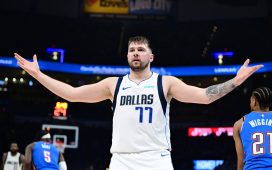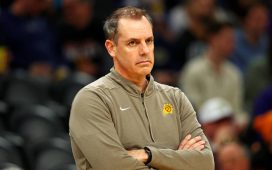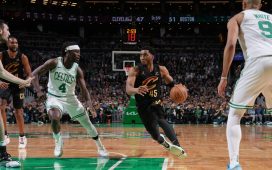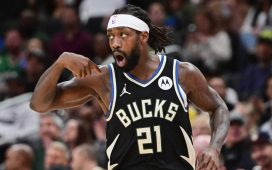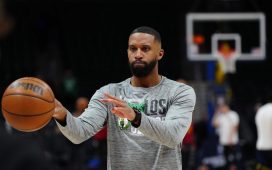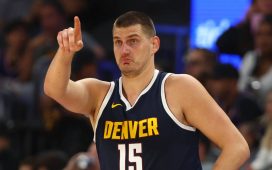ORLANDO, Fla. — Donovan Mitchell said he deserves criticism. Here it comes.
The Cleveland Cavaliers are two games away from having to consider trading him this summer, not because he won’t sign an extension, but because his joining this team didn’t work.
I am trying not to be held prisoner by the 61 points the Orlando Magic outscored Cleveland by in the past two games. This is a 2-2 series. No team has won a road game yet, and the Cavs don’t even have to for advancement. Tuesday’s Game 5 and, if necessary, next Sunday’s Game 7 are in Cleveland.
Mitchell, though, has now played in nine playoff games for the Cavs. The team has won just three, and he was really good in just two — when he posted 30 points in a Game 1 triumph over the Magic, and in Game 1 last year against the Knicks when he posted 38 points in a close loss.
In two games on the Magic’s home court, Mitchell scored 13 points Thursday in the most lopsided loss in Cavs’ playoff history. And Saturday, with his team sitting on a nine-point halftime lead, Mitchell couldn’t add to the 18 points he accumulated through two quarters. He took four shots in the second half, missed them all, committed four turnovers and was on the court for 11 of the 12 worst minutes any good Cavs team has ever played — a third quarter Saturday in which they were outscored 37-10 and stunned to the point of blank stares and few answers.
“I have to be better … it’s simple,” Mitchell said Saturday, a theme he hit often postgame. “Those games we’ve lost, I haven’t been myself. … As much of the success I get, I deserve the criticism, too, and I hold myself to that. My teammates probably hate that I’m saying it, but it’s just a fact. I can’t have 18 points in the first half and zero in the second, on four shots.”
In four games against Orlando this postseason, Mitchell has more turnovers (15) than 3s (seven). He’s shooting 25 percent from long range. In that playoff series against the Knicks last April that left such a deep, dark bruise on the entire organization, he averaged 23 points (he’s averaging 21 in this series) on 29 percent shooting from 3-point range and 3.8 turnovers per game (like he is now).
There were so, so many problems for the Cavs this week in Orlando, and they are worth a mention. But, assuming the version of the Magic we saw in Games 3 and 4 is roughly what we’ll see the rest of the series, Cleveland will not advance if Mitchell plays as he did for most of those games.
Mitchell is thoughtful, courteous to reporters he knows and obviously not afraid to accept responsibility. He also is a tremendous talent, with a closet full of All-Star appearances to prove it. Mitchell could be, if you really think about it, the second- or third-most talented player to ever play for the Cavs, even though he has only been with the team for two seasons.
Trading the assets to acquire him from the Utah Jazz in the summer of 2022 was worth it. I’d argue that point no matter how the rest of this series unfolds. Mitchell turned the Cavs from a Play-In-caliber team to two top-four finishes in the Eastern Conference. When he is on, he, and therefore, they, are appointment viewing. His 71-point game last season is just one example.
But there was an old saying about the last great star to play in Cleveland that went something like this: For all the drama LeBron James either caused or seemed to attract each season, he always made it worth the trouble. Those five NBA Finals berths and the 2016 championship erase all doubt.
Though Mitchell is never outwardly antagonistic toward his coach, the Cavs’ front office or his teammates the way James sometimes was, his contract situation cast a shadow over this entire season. At times, the pressure to win and, beyond that, to make Cleveland as attractive as possible to Mitchell so that he will accept a four-year, roughly $200 million extension this summer, weighed heavily on the Cavs at large.
But was all the internal struggle — the worrying, pressure and second guessing — worth it if Mitchell doesn’t hold up his end of the deal by being the player he has proven in the past he can be? I will never forget the show he put on the with the Jazz against the Denver Nuggets and Jamal Murray in the NBA bubble playoffs in 2020, or his performance in 2021. On both occasions, he was averaging north of 30 points with his star skyrocketing.
As Mitchell said multiple times this week, “That’s who I am,” and also, “That’s why I am here.” If so, he hasn’t done his part yet.
As a resident of a community that has poor winter weather, high local taxes and a terrible track record for attracting NBA free agents, it’s really hard for me to say there is perhaps a scenario in which the Cavs should willingly trade him and acquire an impressive array of assets, instead of ink him to a $50 million-per-year extension. And maybe that’s not even really my point.
What is potentially two games from coming true is the Cavs, as constructed with Mitchell, don’t work well enough. If they are to lose another first-round series, it will almost surely trigger massive changes throughout the organization, with every possible angle on the table.

Cavaliers coach J.B. Bickerstaff looks on during Game 4 of Cleveland’s series with Orlando on Saturday. (Ray Seebeck / USA Today)
Coach J.B. Bickerstaff, again, is not having a great series. He was in danger of losing his job early this season. He rallied the team to go on such a magical winning streak that, for two months, the Cavs were the best team in the NBA. Now, again, he finds himself on the wrong end of coaching adjustments made by his opponent (so far). Jarrett Allen, by far Cleveland’s most consistent player in this series, seemed to call out Bickerstaff’s defensive scheme in his postgame comments after Game 3.
Evan Mobley is eligible for a lucrative contract extension this summer. Orlando reserve Mo Wagner seemed to cut right through Mobley’s chest in the second half Saturday. Mobley finished with 14 points (just two in the second half) and nine boards. As a team, the Cavs finished with just two offensive rebounds. It was the second consecutive game in which Orlando owned Cleveland on the glass. Mobley has performed at an All-Defense level for his three NBA seasons and made incremental improvements offensively, but in the playoffs has been, on occasion, pushed around. He is only 22 and deserves more time for his body to fill out, but given the pressure of playing for a win-now franchise, Mobley’s value will come into question if the Cavs lose this series.
Darius Garland is still shooting over 40 percent from 3 in this series but is averaging just 12 points — with just five in that Game 3 debacle. Garland is finishing the first year of a five-year, nearly $200 million extension himself. Can anyone say, based solely on the evidence before them, that the Garland-Mitchell pairing works when the games matter most?
If we’re talking about the potential for major changes in the event of another first-round exit, there is no law that says that if the Cavs must part with one, Mitchell is the one who goes.
The Magic’s reserves outscored the Cavs’ bench 43-15, but halfway through the fourth quarter, that tally was 38-4. The Cleveland front office’s two key additions last offseason, Max Strus and Georges Niang, are struggling mightily in this series. Isaac Okoro is headed for restricted free agency, and after a nice regular season, easily the best of his young career, he is again doing himself no favors in the playoffs. Dean Wade was unplayable in the playoffs last year, and now, having much improved through the course of the regular season, his absence from the team because of a sprained knee is proving costly.
Let’s stop there. The blame can flow in almost any direction for what’s transpired the last two postseasons in Cleveland, from roster construction to struggles on the bench to players underperforming. But it’s not fair to the rest of the crew to let it flow at them, when Mitchell is not pulling his weight in the most important games either.
Of everything said by Cavs personnel in the postmortem Saturday, outside of Mitchell declaring he deserves criticism, I found similar statements made by Garland and Bickerstaff the most interesting. They both said, essentially, that when the Magic crank up their intensity, make a run and dare the Cavs to fight back, Cleveland needs to “come together” in those moments. They were suggesting it didn’t happen in Games 3 or 4.
Mitchell, in explaining what they meant, said: “I would say we haven’t done it collectively on the floor, but I don’t think as a group we’ve pulled apart from each other.
“When people say that,” Mitchell said, “it’s more so we have to find a way to — when they’re pushing us off our spots, we can still find ways to execute. … Whatever facet that means for each player is different, but I think that’s where that comes in. Being able to stick together in our offense.”
The Cavs must come together, right now, over Mitchell. Is he ready?
(Photo of Donovan Mitchell: Don Juan Moore / Getty Images)

